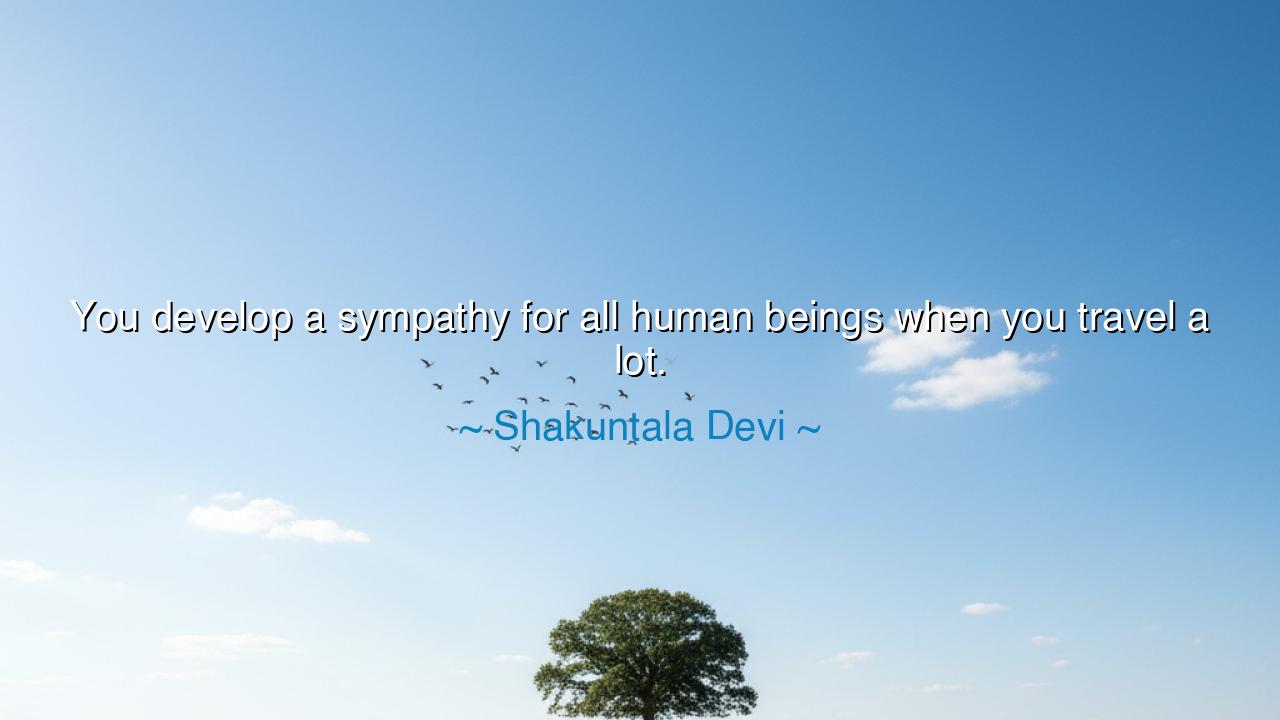
You develop a sympathy for all human beings when you travel a






Hear the luminous words of Shakuntala Devi, the “human computer,” whose genius in numbers was matched by her wisdom of the heart: “You develop a sympathy for all human beings when you travel a lot.” Within this saying shines an ancient truth—that the more the soul moves beyond the narrow walls of its birthplace, the more it learns to see itself in others. For travel is not only the crossing of land and sea, but the widening of perception, the breaking of illusions, the awakening of kinship with all humanity.
The meaning of this truth rests in the nature of encounter. When a man or woman remains in one place, among one people, they easily come to believe their way is the only way, their customs the only customs, their suffering the only suffering that matters. But when one travels, meeting faces of many colors, hearing tongues of many shapes, seeing joys and sorrows carried in different garments, the heart learns humility. The stranger becomes familiar, and the boundaries of tribe and nation fade. Sympathy is born not from theory, but from the sight of another’s humanity reflected back to you.
Consider the tale of Mahatma Gandhi, who as a young man journeyed from India to South Africa. There he endured humiliation and discrimination, yet he also saw the struggles of peoples beyond his own. His heart expanded to embrace not only Indians, but Africans, and later, humanity itself. His travels taught him that injustice wears many faces, and that to fight for justice in one place is to fight for it everywhere. In this way, sympathy became his teacher, and his weapon.
History offers other mirrors. The great Ibn Battuta, who wandered across the known world in the 14th century, from Morocco to China, wrote not only of cities and rulers but of the people he met—merchants, mothers, slaves, poets. His journeys transformed him, teaching him to see the common pulse of humanity in lands vastly different from his own. Through travel, he gained not only knowledge, but a sympathy that transcended border and creed.
Devi herself, through her travels as a performer and mathematician, saw the hunger of the poor, the laughter of children, the dignity of workers, and the shared yearning for love and respect. She knew that while languages change and traditions vary, the human heart beats to the same rhythms everywhere. Thus her words are not speculation, but lived experience: sympathy grows naturally when one steps beyond their own narrow corner of the world.
The lesson for us is profound: if you would learn compassion, do not remain only where you are comfortable. Seek out the unfamiliar. Walk in the markets of distant towns, listen to the songs of foreign tongues, sit with the sorrows and joys of strangers. Even if you cannot cross oceans, travel through books, through stories, through the lives of those different from you. Every journey—whether of body or of mind—widens the heart and teaches sympathy.
So, children of tomorrow, take these words as both guide and challenge: do not let your love be small, confined to your own kin or kind. Let travel, in whatever form you can embrace it, stretch your soul until it can embrace all humanity. For as Shakuntala Devi declared, “You develop a sympathy for all human beings when you travel a lot.” And in that sympathy lies the key to peace, to wisdom, and to the recognition that we are all, in truth, fellow travelers on the same road.






AAdministratorAdministrator
Welcome, honored guests. Please leave a comment, we will respond soon